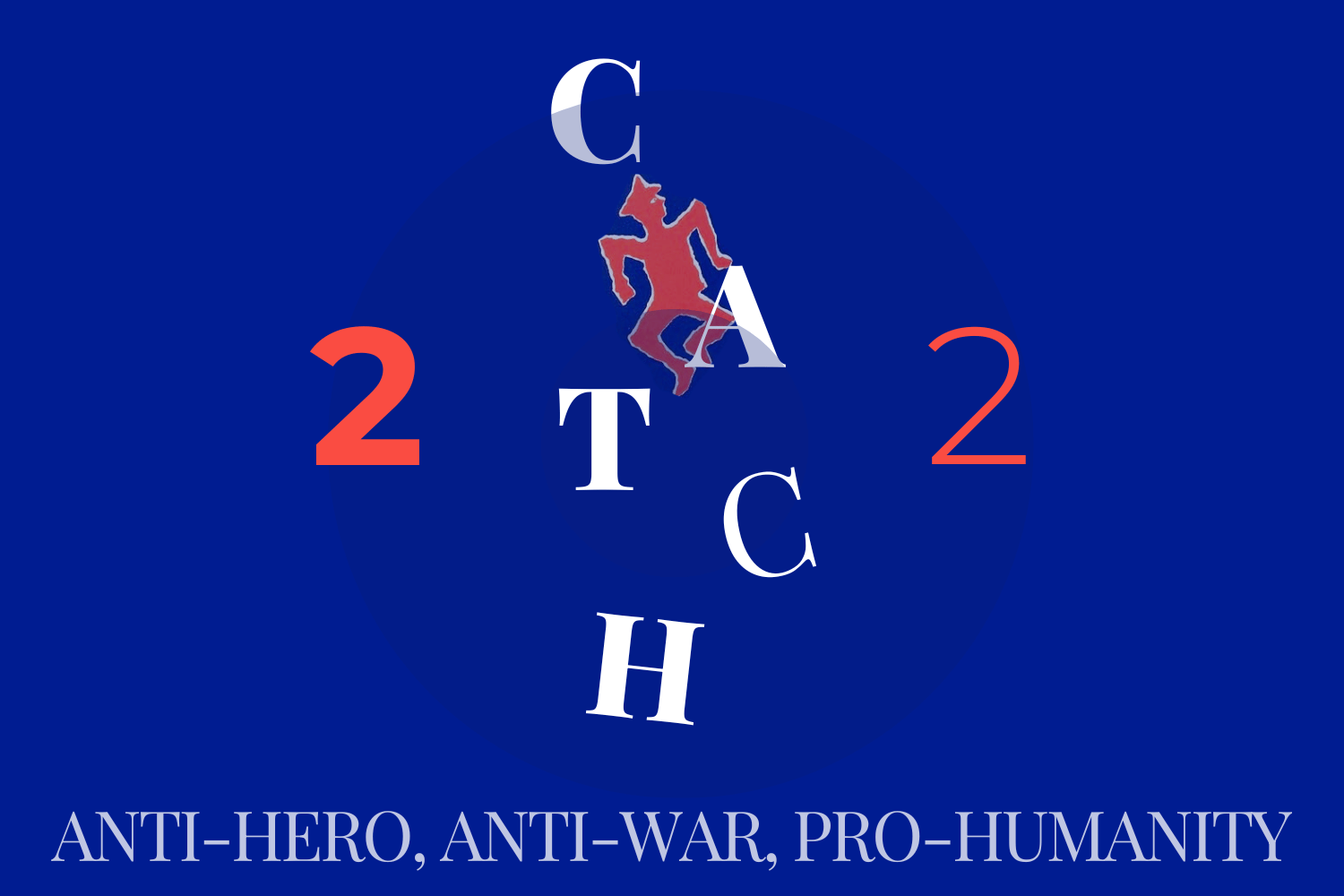
The revolutionary novel and its revelations on the inherent flaws of order & war, morality & immorality, and human belief.
THIS ARTICLE IS NOT COMPATIBLE WITH CELL PHONES
A marionette soldier dances across a stripe of striking lapis, eyes angled upwards at the titular CATCH-22, and held in place above a bolded text reading JOSEPH HELLER. Behind the cover hide nearly half of a thousand pages, blurring to portray the mimicked odyssey of Captain John Yossarian of the 256th Squadron at World War II’s final corner. Caricatured characters, quizzically logical humor, time warps and jumps, and subversive yet completely sensical representation of war and power weave within them a – both textual and conceptual – masterpiece.
Catch-22, with its figureheads, pioneers anti-war and satirical novels, and shines law and war in an inviting, yet unmistakably critical, spotlight. By humanizing war, law, and its own protagonist, the anti-hero, anti-war, and anti-“cold law” (self-defined) novel finds faults in our political-societal structures, perceptions, and… ourselves.
Anti-Hero: The Humanization of War
When considering the traits and characterizations of the figures within Catch-22, Captain John Yossarian is far from the novel’s protagonist. Paranoiac, cowardly, deceitful, proud, Yossarian finds entertainment in carelessly censoring letters among soldiers, feigning a liver condition to abstain from action, and the treacherous Catch-22 which otherwise would leave him with no other choice. Despite these apparent traits, he later braves his trepidation to fly his missions, facing death with duty – but his initial attempts to avoid them reflect in him both reasonable fear and an all-too-human self-prioritization above the potential wellbeing of others. The presence of these objective flaws stands at a tangent with Aristotle’s Nicomachean Ethics, in which the Virtuous Character (usually the protagonist) agrees with commonly-accepted moral ideals and has the discipline to follow them, while the the Incontinent Character sees the same, but cannot exert the control needed to do take action accordingly. Yossarian’s fluctuation of behavior, between “unethical” – taking advantage of a hospital to prolong his return to duty – and commendable – flying in the face of all-consuming danger – teeter him at the brink of both categorizations, completely depending on one’s perspective, and therefore one’s own identity. It plunges him out of the surface of print on paper to the depths of human complexity and the subjectivity of morality, and it is in this realization that a pillar of Catch-22‘s anti-war message stands: conflict is subjective – as additionally seen in the layering of different perspectives throughout the chapters on the same event – and so, among those fighting, and to Yossarian, at least: what’s the point?
Anti-“Cold Law”: Catch-22
The titular provision prevented soldiers from dismissing themselves from incredibly dangerous missions with the following logic:
- You cannot fly if you are deemed insane
- However, if you ask to be grounded from these dangerous missions (even on the basis of #2), you must be sane
- Because “nobody who wants to get out of combat duty is really crazy”
- If you do not ask, you must continue with your missions or risk desertion
(If you fly these obviously perilous missions, you must be insane)
Catch-22 then lended its name to a descriptive term for paradoxical “catches”, claims, policies, and regulations. It proved ineffective in any endeavor but its own, and therefore only served to keep soldiers in duty, additionally coining the term (in this article) of “Cold Law”: a provision with no consideration of human variability and consequent exception. It may stem from previously-ironclad rules that had been weathered with the changes of time and culture, or fall entirely outside of established policy and apply to core components of the United States economy and society. Proudly capitalistic in nature, it inadvertently pools the poor and less-advantaged populations at the bottom of the “pyramid”, and prevents them from advancing with a famous employment-related Catch-22: in order to gain a job, one must have experience. In order to garner experience, one must gain a job.* The presence of Catch-22’s in the modern world outline a flaw in society and its regulations – a paradoxical hiccup in law and order – and demands some type of change (or, at least, the writing of a novel criticizing it).
Pro-Humanity: Conclusion
The idea of humanizing war and law both serve to present them to the public as more of what they are: capable of flaws, and far from objective. Catch-22, in its addressing of both, allows for a wit-filled criticism of our common perceptions on morals, ethics, and ourselves. Is war worth it? Can we honestly say what is good and bad, and what warrants our “superior” analysis?
As for a relevant quote, only one comes to mind:
"There is no such thing as a moral or an immoral book. Books are well written, or badly written. That is all.
With its combination of caricature and intricacy, it’s wonderfully well-written – but that’s a matter of opinion.
Analysis of Catch-22
by Lara Sahagun
Citations
Heller, Joseph, 1798-1849. Catch-22, a Novel. New York : The Modern Library, 1961.
Henriques, Gregg, Ph.D. “Virtue and the Four Types of Character.” Psychology
Today. Last modified June 11, 2013. https://www.psychologytoday.com/us/blog/
theory-knowledge/201306/virtue-and-the-four-types-character.
Notes
*see Introducing The Poverty Paradox, by Lara Sahagun, on The Boston Hound for a critical Catch-22 in welfare economics.
